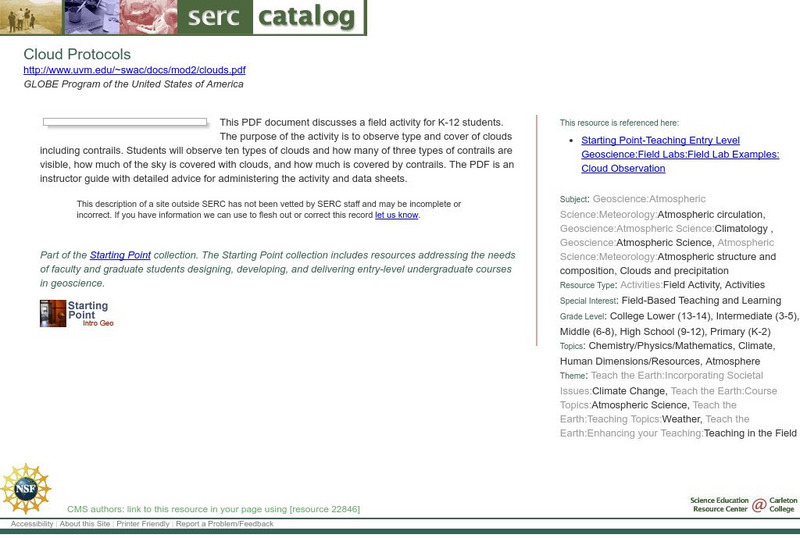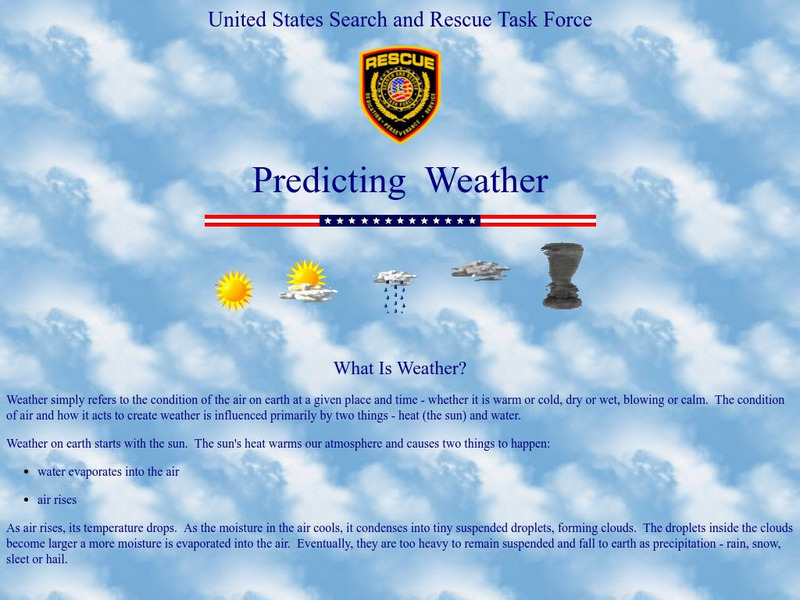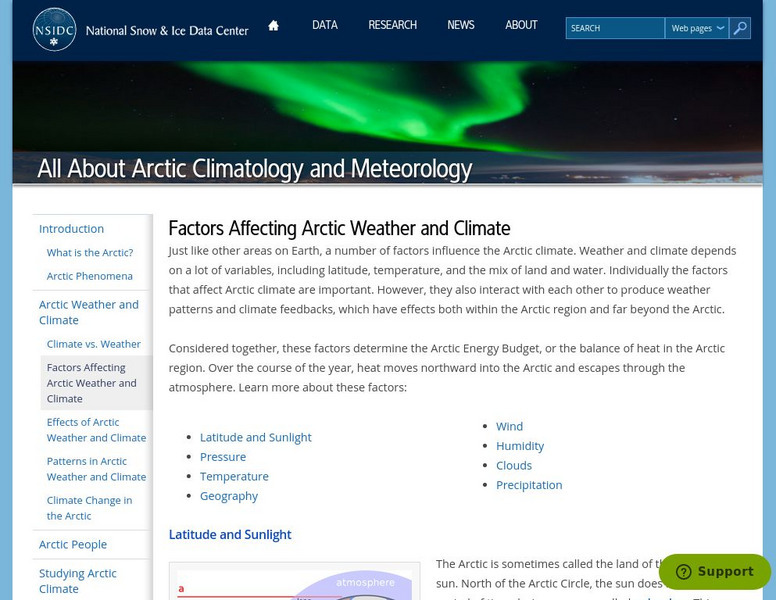Globe
The Globe Program: Clouds Module
Activities give students the opportunity to describe the shape and appearance of cumulus clouds and learn the types of weather that are associated with them. They identify cloud types using cloud classification names and explore the...
Science Buddies
Science Buddies: Cumulus Maximus: Make Your Own Cloud!
In this experiment, you'll make your own cloud in a jar, and get to test the conditions that are required to make a cloud form.
Annenberg Foundation
Annenberg Learner: Weather: The Water Cycle
An article about the water cycle and the role that water plays in cloud formation.
Other
Gorp: Using Clouds to Forecast the Weather
This resource provides information on the four main types of clouds that form in the atmosphere. There are high clouds, middle clouds, low clouds and clouds with vertical development.
University Corporation for Atmospheric Research
Ucar: Web Weather for Kids: Create a Portable Cloud
Using six common objects you can make a portable cloud. Get all the directions you need at this site.
Science Education Resource Center at Carleton College
Serc: Cloud Protocols
Students observe ten types of clouds and visible contrails, and determine how much of the sky is covered with clouds or contrails.
Other
U.s. Search and Rescue Task Force: Predicting Weather
Information on what weather is to begin with, then progresses to how scientists can predict the weather. Common ways to predict weather are also included such as use of a barometer and rain gauge.
TeachEngineering
Teach Engineering: Weather Basics
Students are introduced to the basics of the Earth's weather. Concepts include fundamental causes of common weather phenomena such as temperature changes, wind, clouds, rain and snow. The different factors that affect the weather and the...
National Snow and Ice Data Center
National Snow and Ice Data Center: Factors Affecting Arctic Weather and Climate
An introduction to the factors that affect the Arctic's weather and climate: latitude, land/sea distribution, solar radiation, air temperature, air pressure, winds, humidity, clouds, and precipitation.
Other
Northern Michigan University: Cumulus Clouds
This brief site provides a connection between cumulus clouds and upcoming weather, explains why these clouds are white and puffy, and describes how these clouds are formed.
Ducksters
Ducksters: Earth Science for Kids: Weather Glossary and Terms
Explore the concepts of climate, cloud, front, dew, fog, humidity, isobar, supercell, and thunderstorm on this site.
Alabama Learning Exchange
Alex: How Clouds Form
Cloud formation results when warm, humid air rises and cools, causing the water vapor in the air to condense and form clouds. In this lesson, students will conduct an activity that demonstrates how this occurs.This lesson plan was...
Geographypods
Geographypods: Theme 2: Natural Environments
A rich collection of highly engaging learning modules on topics related to the natural environment. Covers four main areas - plate tectonics, forms and processes, weather and climate, and rainforest and desert. Within each of these,...
Extreme Science
Extreme Science: Tornadoes
Funnel clouds have been around for a long time. Check out the story of tornadoes and find out more about an outbreak of tornadoes in April of 1974.
University Corporation for Atmospheric Research
Ucar: Tornadoes
A dark funnel of cloud extends below a storm. If it reaches the ground, it's a tornado.
Ducksters
Ducksters: Earth Science for Kids: Weather: Tornadoes
Explore tornadoes on this website! Kids learn about tornadoes including how they form, characteristics, types including supercell and waterspout, categories, and fun facts.
Other
About North Georgia: Battle of Lookout Mountain
A description of the military actions taken on Lookout Mountain in November, 1863. Read about the weather conditions that influenced the poetic name of the battle as the Battle Above the Clouds.
Other
Boston Children's Museum: Beyong the Chalkboard: Nephoscopes
In this activity, children will create a tool called a nephoscope that helps scientists determine the direction that clouds are moving, which also tells them the direction that the wind is blowing above them.
University of Texas at Austin
University of Texas: Thunderstorms
You can find out the conditions for a thunderstorm, the life cycle, types, and wall clouds.
University of Wisconsin
The Why Files: Control a Tornado? Absolutely!
Control a tornado's intensity by manipulating its width and rotation speed.
Science4Fun
Science4 Fun: Tornado
Explore how tornadoes are formed, learn about the parmeters of a tornado, discover the different types, and find out where they occur.
University Corporation for Atmospheric Research
Ucar: Sundogs
Learn all about sundogs, an optical phenomenon in the atmosphere.
Other popular searches
- Weather Unit Plan Clouds
- Weather Clouds
- Weather and Clouds
- Weather Fronts Clouds
- Weather Clouds Experiment
- Weather Clouds Chart
- Weather of Cumulus Clouds
- Cumulus Clouds Weather
- Weather Clouds Diorama
- Environment Weather Clouds
- Weather Clouds Winter
- Weather Clouds Experiiment














